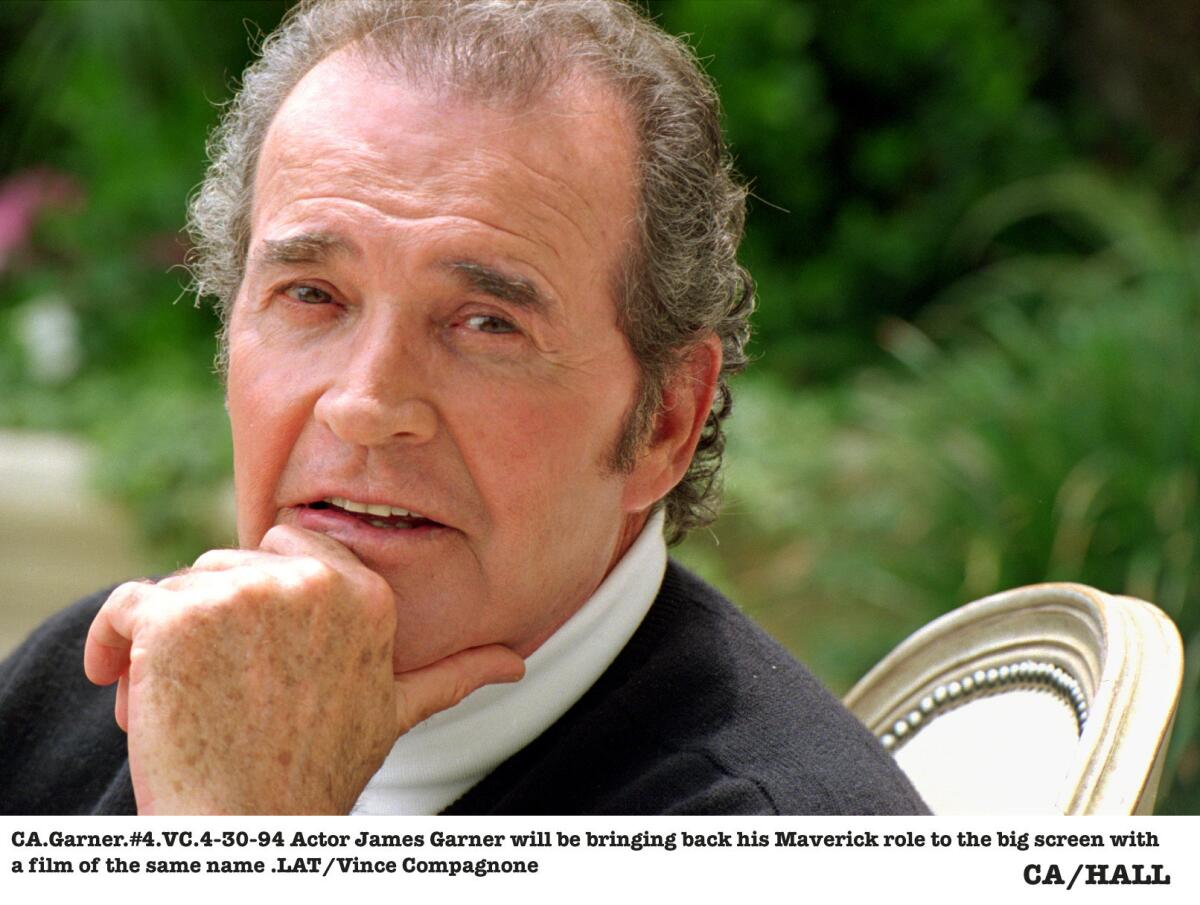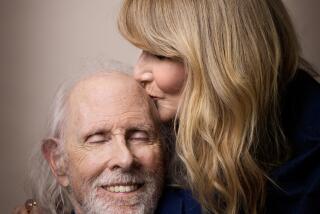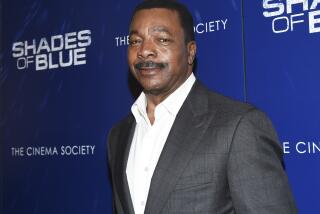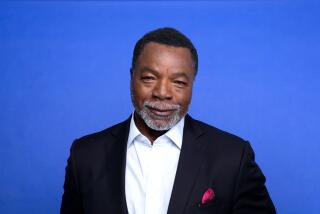From the Archives: Q&A with James Garner on life’s lessons

It’s hard to believe that it’s been 37 years since James Garner became an international star as the charming Western hero Bret Maverick on the classic ABC series “Maverick.”
Over the past three decades, Garner has become one of Hollywood’s most durable and popular actors, able to go from light comedy to drama with the greatest of ease. He’s starred in such hit movies as “The Great Escape,” “Support Your Local Sheriff” and “Victor/Victoria.” Garner received a best actor Oscar nomination for the 1985 romantic comedy “Murphy’s Romance.”
He won an Emmy as private investigator Jim Rockford on the popular ‘70s series “The Rockford Files” and starred in the critically acclaimed Hallmark Hall of Fame dramas “Promise,” “My Name is Bill W.” and “Decoration Day.” Last month, Garner received a Golden Globe for his performance in the HBO movie “Barbarians at the Gate.”
His latest TV project is Sunday’s Hallmark Hall Hall of Fame presentation of “Breathing Lessons,” based on Anne Tyler’s 1988 Pulitzer Prize-winning bestseller.
In the comedy-drama, Garner plays Ira Moran, a down-to-earth realist who owns and operates a frame shop in Baltimore. For 29 years he’s been married to Maggie (Joanne Woodward), a sweet but flighty woman. During the course of one remarkable day, the couple review their lives together and renew their love.
Times Staff Writer Susan King chatted with the personable actor about “Breathing Lessons,” his own marriage and his participation in the upcoming “Maverick” feature, which stars Mel Gibson as Bret.
Do you see yourself and your wife, Lois, in “Breathing Lessons”?
I see my wife and I a lot in it. I was trying not to think about that during the picture. But I don’t think Joanne or I could help but relate to our respective spouses.
Ira and Maggie have been married 29 years in the movie. How long have you two been married?
Thirty-seven years. I had been married about five months when I went to Japan to make “Sayonara.”
Has your relationship with your wife changed over the years?
After a time, a lot of tolerance goes on. It really does. My wife and I, I know, are much more tolerant of each other than maybe we were when we were younger. At that time, young love overcame everything and now a more mature attitude prevails. I just let my wife get away with murder, like in this.
Ira and Maggie seem to be each other’s best friend.
They are. That’s who they have in life. They have each other. I don’t think he has friends. And with Maggie, everybody’s a buddy. She’s never met a stranger.
Did you get the opportunity for rehearsal before filming started?
We had a week’s rehearsal. I think it’s imperative. I think if you are going to do a good movie, you need a least a week’s rehearsal. I’ve done pictures where you go in the first day and they want you to do a love scene and you really don’t know the people. That’s really hard to do--any kind of emotional scene. I can’t tell you how many pictures I have done that the first day shooting you just throw away because it’s not any good. There’s no relationship with the people.
Do you think “Breathing Lessons” would have been made as a feature today?
No. But they didn’t want to make “Murphy’s Romance.” Sally Field had to fight for it. There was no sex, no violence. It was a big hit.
Do you think TV is willing to tackle subjects that features won’t?
There are a lot of things in TV that are so much better than in movies. And also now that cable has moved in, you can do a lot of things on cable you can’t do on (network) TV and a lot of things on cable you would rather do than in movies.
Like “Barbarians at the Gate,” which was made by HBO?
Yep. “Barbarians” was ideal for cable. It was going to be a feature and it was cut off the schedule at Columbia. They had an austerity program. That was one of the films that they dropped. So producer Ray Stark went to cable.
It was great fun. It held everybody’s interest, and then they put it on (commercial) television. They put it on Fox. I understand they ruined it.
Didn’t you refuse to dub your lines so the R-rated dialogue would be suitable for network TV?
I went in and they said, “Could you change this?” I said, “No, I can’t do that.” Your lips are doing one thing and your voice is doing another. I didn’t sign to do that. I did about three or four lines and I said, “This is not going to work and I refuse.” I left. I said, “Go get somebody else to do it.” They did, and they tried to convince everybody it was me. There is a guy in town who does (my voice). He’s doing Sees’ commercials and everybody thinks it’s me.
What was it like doing the “Maverick” movie?
It’s fun. I am playing Zane Cooper. I guess he’s the protagonist--the strait-laced marshal. You will be surprised when you see the movie--a lot of twists and turns.
How is Mel as Maverick?
He’s wonderful. It was good to see him do it because he has such charm. He’s funny. He’s a great Maverick.
You were under contract with Warner Bros. when you became “Maverick.” Were you told by the studio to do it?
I was told to do “Maverick.” I was over making “Sayonara” in Japan. They were testing people here for the part of Maverick. I didn’t know anything about it. They got in touch with the production company (in Japan) and said, “When you finish with him over there, send him home.” So I came back home and I did the pilot of “Maverick.” Then the company came back here from Japan and I finished the movie and then I did the movie “Darby’s Rangers.” Then they sold the pilot and I did the series. They tested a lot of people. They were looking at dailies coming back from “Sayonara” and they said, “We will use him. We got him for 250 bucks a week, let’s use him.” And that’s really what it was. It was finances.
More to Read
The complete guide to home viewing
Get Screen Gab for everything about the TV shows and streaming movies everyone’s talking about.
You may occasionally receive promotional content from the Los Angeles Times.







